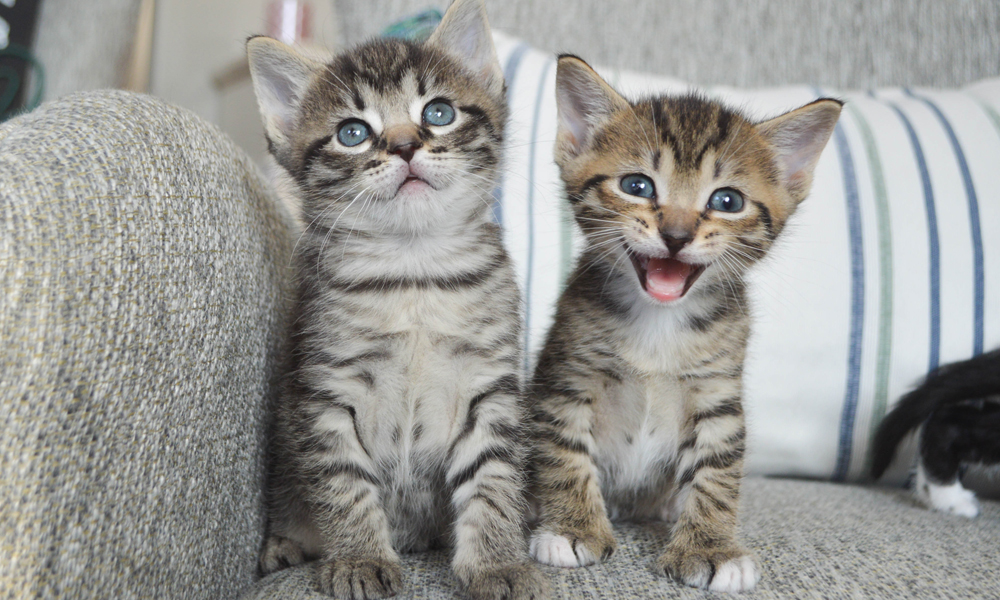For a pet that has a reputation for being on the quiet side, cats are surprisingly vocal creatures. At unexpected times, felines can make vibrating chatters, trills, beeps, chirps and other sounds that can sound downright odd. Getting to know your cat’s unique sounds is part of what makes life with cats so fascinating and endearing.
Like many social animals, cats make sounds to communicate with each other, their young, as well as their human companions. The sounds cats make have not been studied as extensively as those made by canines, as this article about purring from the BBC explains. However, interest in this field is growing. So stay tuned for new insights on what makes your cat tick. In the meantime, here’s your guide to what we know about cat sounds so far.
Why do cats meow?
Cats meow when they want to play, crave an ear scratch or want a refill of their food bowl. Are you picking up on a theme? Cats meow when they want something from the staff, er, their trusted human companion. Recently, we’ve come to realize that meowing originates as a kitten vocalization — kittens meow to signal hunger or cold or in need of something from Mom. As adults, cats don’t meow at each other, but many (not all) do meow at humans. Usually, it means they want food, water or attention, but here are a few more common situations that bring on meows.
- They want in! (or out!): Even a cat that’s normally on the quiet side may meow and meow and meow when they really, really want to get to the other side of a shut door.
- Greeting: Some cats will excitedly greet you with a chorus of meows when you come home. (You may even feel like they’re giving you a recap of their day.)
- Confusion: Like humans, a cat can experience cognitive decline in their elder years. One sign of this is loud meowing when they become disoriented or confused (especially at night) as a cry for help. If your cat is showing other signs of cognitive dysfunction, such as litter box misses, excessive sleeping, or staring blankly into space, have your pet evaluated by their health provider.
[Read What to do when kitty meows all the time]
The secret healing power of a cat’s purr
Purring is the ultimate sound of kitty contentment. And we humans can’t help but surrender to the infectious vibration of the feline purr. Some pet parents swear their cat has a distinctive purr from all the other cats.
Research reveals purring has a purpose, and it’s really quite beautiful and life-affirming. Purring helps cats heal and keep their bodies in good condition, according to the BBC article mentioned in the intro. The reason is cat purring falls within a frequency of 25-100Hz. That happens to be the range that triggers a healing response in the bones, tissue and skin. So when your cat is dozing off to a purr, he’s in a recovery state that also happens to feel pretty blissful.
Cats purr to signal their deep, deep contentment. But have you noticed your cat purring when she’s feeling stressed, scared or sick? Now you know she’s doing this to help her feel better.
When you’re cozied up with a purring cat, you may be experiencing those healthy healing effects as well. So if you’re feeling under the weather or convalescing, let your cat hang out with you. Think of purring as a form of self-care, for both kitty and for you!
[Read Why having a pet is good for your health and your mood]
Why do cats chirp and chatter?
This is where cat sounds enter the realm of the strange and unexpected for pet parents. If you’re new to living with cats, bird-like chirps and chattering sounds can take you by surprise.
Most often cats make these funny and delightful sounds when they’re watching prey. For example, your indoor cat may be intently watching birds gathering at your backyard feeder, or your outdoor cat has spied a chipmunk in the distance. Some people believe cats “chirp” to mimic their prey. But it seems these are sounds that emit from cats when they’re excited or perhaps even frustrated because they’re unable to get to the prey.
Why do cats yowl?
The word for a cat yowl is caterwaul. When they’re making this sound, it tends to be long and drawn out, like something between a meow and a moan. Some call it melodramatic while for others, it sends a chill up the spine. There’s no mistaking a caterwaul. You know it when you hear it.
Cats wail when they’re in pain. Cats can also let out a howl when they’re feeling insecure or in danger. If you’ve moved to a new home recently, or have introduced a new pet to the household, a cat might make his feelings known with a caterwaul. When you hear this unearthly sound, check on them — they need you.
It’s important to note that if your female cat is not been spayed yet, expect yowling when she’s in heat. Even if your cat strictly lives indoors, she may yowl to get the attention of a male she’s noticed passing through the neighborhood.
Why do cats hiss and growl?
These sounds are sure signs your cat is angry, stressed, annoyed or even fearful. Cats may make these sounds as a warning to another cat. Perhaps a strange cat has entered their territory and they’re demanding they leave — right now! Or they’re warning off one of their feline housemates.
If you’re the target of your cat’s hissing or growling, give your cat some space, because these are signs your cat may be preparing to attack.
- Don’t attempt to pet or soothe your cat until she’s calm.
- Remove children or the other pets, if they’re the targets of your cat’s ire.
- If you must pick up your cat, make sure your arms and hands are protected with thick clothing and gloves.
- Make sure your cat has some place to retreat to, where she’ll be left alone until she’s feeling up for interaction again.
What kind of sounds does your cat make? As you get to know your cat’s unique vocal tics, along with the body language and behavior that often accompany them, you’ll have a better understanding of what’s on her mind. That’s one way to build good, healthy connections with our feline friends.
A high-quality diet that keeps your cat’s gut ecosystem in balance will help kitty better absorb essential nutrients and keep their immune system in top working order. NutriSource is proud to formulate all its pet diets with their innovative Good 4 Life® system that builds good gut health for the cat and a better litter box experience for you. Shop local and find NutriSource at an independent pet retailer near you.


